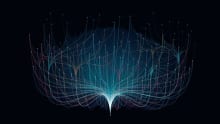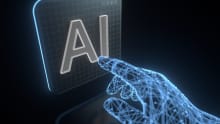Will AI kill jobs or liberate human talent? Well, it could rewrite history!

For centuries, technological leaps have triggered anxieties about vanishing jobs. Scribes trembled before the printing press, bank tellers braced for the ATM's arrival. Yet, history often surprises us. These advancements transformed employment landscapes and birthed new opportunities even as old jobs faded. Now with AI and automation at centre stage, will history repeat itself? No innovation provokes greater unease than AI and automation, so a definitive answer on the ultimate job creator – or job killer, as everyone fears – proves to be elusive as yet. Leaders are confronted with a critical choice: allow AI to displace workers, or create frameworks for algorithms to augment innate human strengths.
The current climate is thick with unease, with 75% of Americans fearing AI's impact and predictions of 300 million jobs lost painting a grim picture. However, beneath the "job-killing machines" narrative lies a more nuanced reality. While some roles, especially those involving repetitive tasks, may diminish, history suggests this is only the beginning. Just as bank tellers gave way to ATM technicians, software developers, and customer service experts, new opportunities will likely emerge even as some positions fade.
Perhaps then, it's time to ditch the binary view of AI as a singular force of destruction. It's true, AI's automation potential is undeniable, freeing us from drudgery and empowering us to prioritise what makes us uniquely human: creativity, innovation, and social intelligence. This isn't just about surviving AI; it's about using it to evolve.
Yet, unlocking AI's full potential requires both opportunity and caution, especially in the debate on advances in AGI. Leaders like Microsoft CEO Satya Nadella advocate for harnessing AI's benefits while carefully managing its risks. As Nadella emphasises, this delicate balance involves striving to "maximise the opportunity and mitigate the dangers."
But, perfecting this complex waltz won't be easy. The gravity of ethical concerns, bias, and the potential for algorithmic manipulation complicates the challenge further.
And importantly, Equipping our workforce with the largely unknown skills needed to thrive in this AI-powered future is a mammoth task. For PwC, this meant implementing mandatory training for its entire U.S. workforce over a five-month period.
The future will depend on the steps we take as governments, policymakers and corporations today. The power lies in our hands. The imminent enforcement of the EU AI Act has stirred controversy. Central to the discourse is the regulation of general-purpose models and their foundational counterparts. Equally pivotal is the AI Act's efficacy in averting harm in areas like law enforcement, migration, and national security.
The hard facts: Job losses in the millions
The employment landscape faces potential disruption, especially in sectors like manufacturing, agriculture, accountancy, and healthcare. A 2021 OECD study warns that over 200 million workers, or 14% of jobs, are at a high risk of automation. Oxford Economics predicts that up to 20 million manufacturing jobs globally could be replaced by robots by 2030. From manufacturing and agriculture to accountancy and client service roles, the impact spans diverse sectors. While not all occupations are fully automatable, McKinsey reports that 60% of all jobs involve at least 30% technically automatable activities.
Algorithms with the capability to scan and synthesise documents have the potential to automate around 25% of tasks in the legal industry. Software bots, employing natural language processing, are already taking over tasks like reviewing and redacting contracts, leading to increased efficiency in law firms with fewer hires. In the healthcare sector, AI diagnostic assistants demonstrate equal or greater accuracy than radiologists in analysing medical scans for specific conditions, such as fractures and tumours. Despite ongoing labour shortages in healthcare, this technological advancement may reduce the need for extensive departmental staff and hiring.
Retail faces widespread cashier displacement from automated checkout tech. Amazon Go's cashier-less stores already employ AI sensors, computer vision and predictive algorithms to eliminate checkout lines. One of the most common US jobs, over three million cashier roles, could dwindle. While new shop assistant or technician roles may arise, job losses likely outweigh gains.
AI's versatility poses a challenge as it infiltrates both routine manual labour and complex analytical work, jeopardising roles once deemed safe. For instance, AI-based software now handles tasks crucial to accountants and auditors, such as spotting anomalies in financial documents.
Reskilling efforts lag behind, with a McKinsey study suggesting over 100 million workers globally may need to switch occupations by 2030. Current retraining programmes show inconsistent success, raising concerns about workers acquiring newly relevant skills amid job transformations.
Inadequate societal safety nets could result in heightened financial polarity and growing inequality, particularly if vulnerable demographics bear the brunt of technological job displacement. This transition may be especially disruptive for mid-career workers struggling to stay employable, emphasising the need to address the human implications of AI.
The coming age of collaboration
Yet while some occupations will decline, it does not portend long-term unemployment, as productivity gains can spur new economic activity. Crucially, AI cannot replicate intrinsics like judgment, creativity, and empathy - human strengths likely to increase in value. The future may thus see AI handling routine tasks to liberate human capacity for higher-order thinking and innovation.
For example, a recent JP Morgan trial found employing algorithms to analyse legal documents boosted lawyers’ productivity by over 350%. This allowed attorneys to increase client face time and strategic thinking.
Doctors too can leverage machine learning for improved diagnostics and personalised treatment recommendations while focusing their expertise where it adds the most value. AI is imperfect at soft skills we prize like judgment, creativity, persuasion and emotional intelligence. Workers who complement AI’s raw computational power with such distinctly human talents will likely thrive.
In fact, AI may even help resuscitate vanishing expertise like artisanal craftsmanship. Algorithms capable of consistency in repetitive steps could handle drudgery, leaving the uniquely human touches for master builders to perfect. Such collaboration allows both humans and machines to focus on their respective strengths.
Rather than mass displacement, many jobs may evolve toward this interplay of AI handling routine elements while leaving room for human artistry, ethics and innovation. However, workers will require continual reskilling to keep pace and capitalise on emerging hybrid roles.
Policy advances around lifelong education access and portable benefits would ease what will likely be a turbulent transition period.
The outlook hinges on adaptable policy
Ultimately AI’s impact depends heavily on leadership and communication from policymakers and business executives. If deployed transparently and strategically alongside upskilling support, AI can enhance productivity and job satisfaction. But lacking foresight, its effects may concentrate hardship on vulnerable groups.
The greatest long-term advantage will go to those who can creatively apply AI to amplify their talents. With the right frameworks, algorithms can take over repetitive tasks while liberating human gifts like curiosity and empathy. This new frontier of collaboration is both promising and daunting in its complexity.
“The future of human-AI collaboration hinges on policy choices today. With the right frameworks, algorithms can liberate innate human strengths."
Navigating the automation wave requires nuanced perspectives that consider both potentials and pitfalls. Policy choices today will shape whether AI sinks workers or provides a rising tide to buoy humanity’s enduring comparative strengths over machines.















